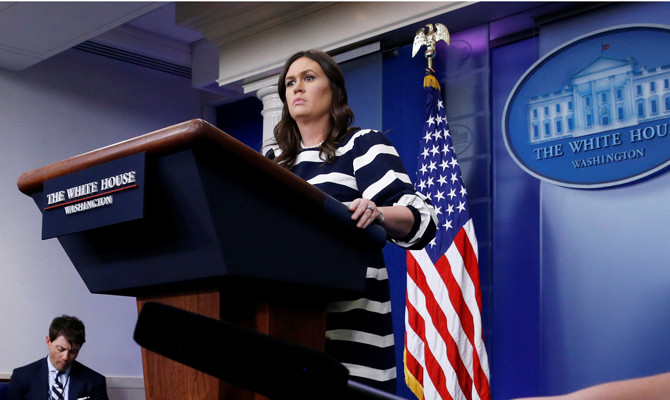WASHINGTON/TEHRAN: The White House on Friday condemned Iran’s “reckless actions,” accusing the country of “exporting destabilizing influence throughout the Middle East.”
White House spokeswoman Sarah Huckabee Sanders issued a statement citing actions in Syria and Saudi Arabia. She called on “responsible nations” to pressure Iran to “change this dangerous behavior.”
An Iranian rocket barrage on Israeli positions in the Golan Heights prompted an Israel attack Thursday on Iranian targets in Syria. Saudi Arabia is also accusing Iran of providing missiles that Yemeni rebels have fired toward Riyadh.
Trump spoke with British Prime Minister Theresa May Friday. The White House said both condemned the rocket attacks.
Downing Street also said May reiterated support for the Iran nuclear deal, which Trump withdrew from this week.
In Tehran, a prominent Iranian cleric threatened two Israeli cities with destruction if the Jewish state “acts foolishly” and retaliates against it again.
The comments by Ayatollah Ahmad Khatami followed a week of escalating tensions that threaten to spill over into a wider conflict between the two bitter enemies.
Israeli airstrikes struck Iranian military installations inside Syria on Thursday — its biggest coordinated assault on Syria since the 1973 Mideast war — in retaliation for an Iranian rocket barrage on Israeli positions in the occupied Golan Heights.
The remarks from Khatami drew chants of “Death to America!” from those gathered for Friday prayers in Tehran.
Thousands later demonstrated across the country to protest President Donald Trump’s withdrawal from the nuclear deal.
The Iranian government warned that it will take “whatever reciprocal measures it deems expedient” if it is not fully compensated for the US withdrawal from the nuclear agreement as provided for in the accord.
A lengthy government statement issued Friday said the other parties to the agreement — especially Britain, France and Germany — must safeguard the accord, implement their commitments, and “proceed from giving pledges to taking practical action without any preconditions.”
Iran reiterated that no provisions or timeframes in the 2015 agreement “are negotiable in any manner.” It also reiterated that the foreign minister is seeking “required guarantees” from the five other parties to the agreement as well as Iran’s other economic parties.
At the same time, the government said it has tasked the president of the Atomic Energy Organization of Iran with “taking all necessary steps in preparation for Iran to pursue industrial-scale enrichment without any restrictions, using the results of the latest research and development of Iran’s brave nuclear scientists.”
The statement was sharply critical of President Donald Trump, calling his administration “extremist” and the US withdrawal from the accord “unlawful.” The government said the US pullout damages US credibility on the world stage and the credibility of accords the US has signed, and puts “the present system of international law in serious danger.”
Free trade pact with Russia
Moscow, meanwhile, said Russia and its ex-Soviet allies will sign a free trade pact with Iran.
Putin’s foreign affairs adviser Yuri Ushakov said Friday the deal between Iran, Russia and other members of the Moscow-dominated Eurasian Economic Union is set to be signed next week. The grouping includes Kazakhstan, Belarus, Armenia and Kyrgyzstan.
While Ushakov noted that the pact’s signing had been planned for long time, the move coincides with the US exit from the 2015 nuclear deal with Iran that set the stage for re-imposing painful economic sanctions against Iran and rattled many US allies.
Ushakov said Putin will discuss the US withdrawal from the Iranian deal with German Chancellor Angela Merkel and French President Emmanuel Macron, who are set to visit Russia later this month.
European Union foreign policy chief Federica Mogherini says the EU is determined to make sure the Iran nuclear agreement is respected despite US President Donald Trump’s decision to pull out.
Mogherini said Friday that “our determination is to keep this agreement in place. Obviously we need the only country that can unilaterally destroy this agreement to stay committed, which is Iran.”
Mogherini says she has been reassured about Iran’s intentions by the declarations of President Hassan Rouhani.
She added that the US cannot undo the agreement by pulling out, saying: “this deal is not a bilateral treaty. It’s a UN Security Council Resolution and it belongs to the entire world.”
Mogherini will chair talks between the British, French, German and Iranian foreign ministers in Brussels on Tuesday.





























